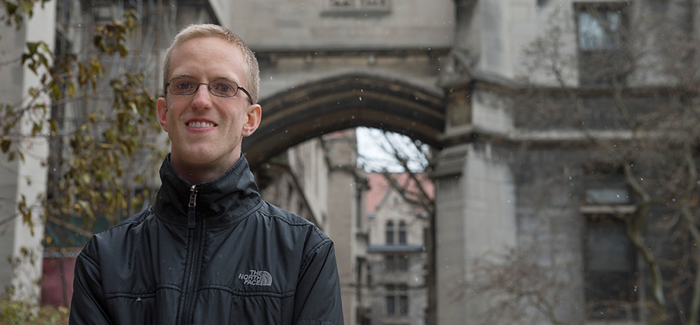Samuel Greene, ’14. (Photography by Robert Kozloff)
Argonne’s Isaacs appointed provost, an energy policy insitute generates hire voltage, the University prepares to debut its Center in Delhi, a Rhodes scholar finds an ideal learning environment, UEI extends its outreach, and the Neubauers receive a precious medal.
Samuel Greene, ’14, is one of 32 American students to receive a Rhodes Scholarship to study at Oxford University next fall. A chemistry major, Greene will focus on environmental research. As an undergraduate he has studied the feasibility of converting organic material to biofuel. Greene tracked methane emissions in Alaska lakes last summer and is writing a master’s thesis on his findings.
Applications to the College for early action increased 6.7 percent from last year with a total of 11,143 students applying. Applications came from every state and a record 79 foreign countries, led by China, India, Canada, and Singapore. The number of African American and Latino applicants also increased from the previous year.
Physicist Eric D. Isaacs, director of Argonne National Laboratory since 2009, has been named University of Chicago provost. Isaacs, who begins his new role March 31, succeeds Thomas F. Rosenbaum, who becomes president of Caltech on July 1. Isaacs, with the University and Argonne since 2003, also has appointments in the physics department, the James Franck Institute, and the College. As Argonne director, he oversaw a 50 percent increase in research funding and helped to establish the Institute for Molecular Engineering and to expand the Computation Institute. In 2012 Isaacs led a team that won a $120 million grant from the US Department of Energy for research on battery technology and energy storage.
Michael Greenstone, U-High’87, a member of MIT’s environmental economics faculty since 2006, has been appointed director of the Energy Policy Institute at Chicago (EPIC), effective July 1. A joint project of Chicago Booth, the economics department, and Chicago Harris, EPIC studies the economic and social impact of energy policy. Chief economist for the Obama administration’s Council of Economic Advisers from 2009 to 2010, Greenstone has also been a member of the EPA science advisory board’s Environmental Economics Advisory Committee and an economic consultant to governments around the world.
In March the University will open its Center in Delhi, a home for research and education for faculty, graduate students, and undergraduates. The center, which will not grant degrees, will focus on scholarship in three broad areas: business, economics, law, and policy; science, energy, medicine, and public health; and culture, society, religion, and the arts. Located in Connaught Place, a cultural and commercial district, the 17,000-square-foot center will also host seminars and conferences. Sanskrit scholar
Gary Tubb will serve as faculty director.
The University of Chicago is part of a consortium awarded $25 million over five years from the National Institute of Standards and Technology to establish a new center of excellence for advanced materials research. Led by Northwestern University and codirected by UChicago’s Juan de Pablo, the Liew Family professor in molecular engineering, the Center for Hierarchical Materials Design will focus on developing computational tools, databases, and experimental techniques to make possible the design of novel materials. The work will encompass both “hard” (inorganic) and “soft” (organic) advanced materials as diverse as self-assembled biomaterials, smart materials for self-assembled circuit designs, organic photovoltaic materials, advanced ceramics, and metal alloys.
Cornelia Grumman, an education policy advocate, has been named the Urban Education Institute’s director of policy and strategic communications. Previously the executive director of the First Five Years Fund, Grumman will lead UEI’s national outreach to policy makers and educators. A 2003 Pulitzer Prize winner for a series of
Chicago Tribune editorials that spurred reform in Illinois’s criminal justice system, Grumman’s advocacy at the First Five Years Fund helped lead to a nearly $1 billion increase in federal investment in support for at-risk students in early childhood.
President Robert J. Zimmer received unanimous support to become the next chair of the Marine Biological Laboratory’s board of trustees, beginning in April 2014. The University formed an affiliation with the private nonprofit laboratory this past July, reestablishing historic ties that date to the Woods Hole, Massachusetts, institution’s founding in 1888. Zimmer, who appointed University vice president and secretary David Fithian as secretary of the MBL Corporation, succeeds Jack Rowe, chair since 2006.
Precious medal
At the Chicago Convenes event in November, Joseph Neubauer, MBA’65, and Jeanette Lerman-Neubauer received the University of Chicago Medal, becoming the 19th and 20th recipients in the medal’s 37-year history. Established by President John T. Wilson in 1976, the award recognizes “distinguished service of the highest order to the University.” Neubauer, a University trustee since 1992, and his family endowed the first chaired professorship in entrepreneurship, created the Neubauer Faculty Fellows program, and, most recently, established the Neubauer Family Collegium for Culture and Society, which fosters collaborative research in the humanities and social sciences.
Educator and pedagogy scholar William Rando has been named director of the University’s expanded and renamed Center for Teaching Excellence, which will support graduate students, fellows, and faculty in their work as teachers. Rando, who begins his tenure in March, led Yale’s McDougal Graduate Teaching Center for 14 years and in 2012 founded the Yale Teaching Center. At UChicago Rando will work with faculty to develop best practices and new techniques for effectively teaching students. He views the Center for Teaching Excellence (previously the Center for Teaching and Learning) as a laboratory, he says, where “teaching and learning become the objects of inquiry and praxis, approached with rigor, commitments, patience, and joy.”

